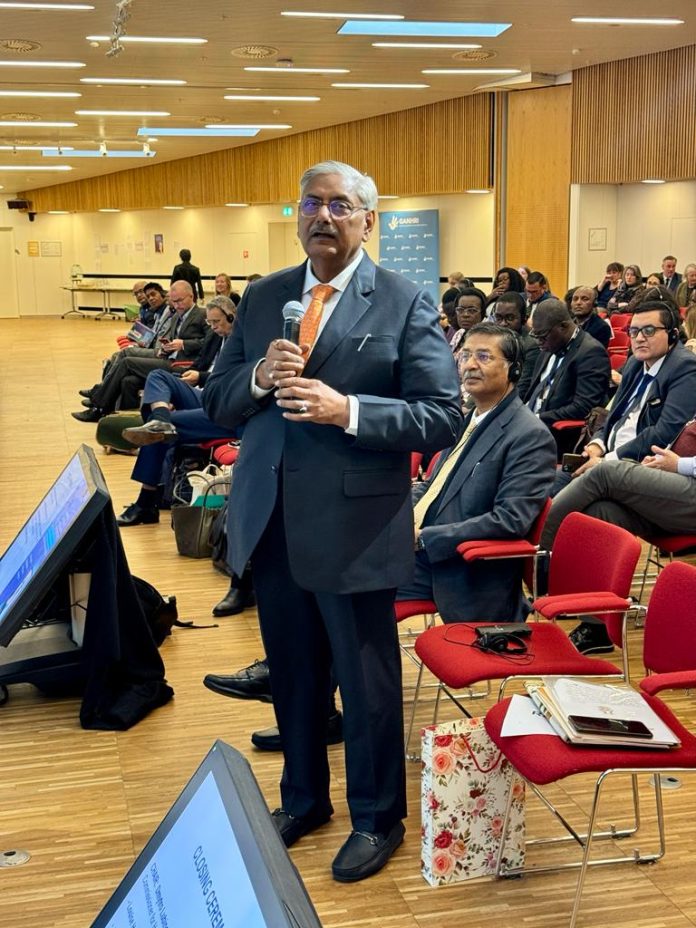Chairperson of the National Human Rights Commission (NHRC), India, Justice Arun Mishra on Wednesday said that it was important to shift the focus from retributive jurisprudence to restitution, reparation and compensation, in order to eradicate the menace of torture and provide justice to the victims of torture.
Addressing the concluding session of the 14th International Conference of the National Human Rights Institutions (NHRIs) on ‘Torture and other ill-treatment: The role of NHRIs,’ Justice Mishra said that everyone needed to work collectively to make societies more humane and civil.
The two-day event, which started on November 6 at Copenhagen, was organised by the Global Alliance of National Human Rights Institutions (GANHRI).
Noting that most of the time the victims of torture were poor and hapless individuals, the NHRC Chairperson said that effective steps were necessary to prevent torture not only in the present, but in the future also.
He said the responsibility lies with the State and its Core institutions to protect the rule of law. There was a necessity to frown upon the impunity that promotes torture and ill-treatment. It is also necessary to hold the concerned authorities accountable for their obligations to prevent torture. To effectively address the practice of torture, prosecution of perpetrators and disciplinary action is non-negotiable.
He said that preventive mechanisms, continuous monitoring and assessment are necessary for the systematic improvement of detention centres, prisons and other places. International collaboration, sharing best practices and evolving strategies to prevent the prevailing physical and mental torture in various forms is essential. Methods of investigation by police need to be modernised.
He said that correctional staff and community-wise attitudinal change must be inculcated. We must ensure transparency in police actions and places of detention. Modern technology must be used to monitor and detect such violations. Slow handling of complaints, and delays in the process of the criminal justice system, compound the problem.
The NHRC, India Chairperson said that sensitization of judicial officers, senior police officials and law enforcement agencies towards torture and ill-treatment of an individual is the way forward. NHRIs, judiciary and other supervisory authorities must act along with state machinery, civil society and human rights defenders to address this issue.
Referring to the role of NHRIs in this context, Justice Mishra said that these institutions should be backed by suitable laws and independence in their work with adequate resources.
It is necessary that a culture to respect NHRIs on the lines of judiciary is nurtured in the society and government.
Follow up on the recommendations by the NHRIs and ensure accountability was concomitant with an effective remedial system, he added.
Justice Mishra said advisory jurisdiction of NHRIs can be used effectively for preventing suicides in places of detention, ensuring mental health check-ups, and improving the living conditions of mental hospitals, juvenile justice homes, shelter homes, and drug de-addiction centres.
He said surprise visits and inspections by NHRIs and their Special Rapporteurs/ Monitors serve the purpose. NHRIs must advise the government and Parliament on human rights accountability, foster political will to prevent torture, fight against opaqueness and ensure respect for the rule of law.
Earlier, chairing a session on ‘Practical perspective on protection: Complaints, investigations, access to justice and reparations’, Justice Mishra gave an overview of the Indian jurisprudence and various practices that evolved over the years, both by the judiciary and NHRC.
He said that Public Interest Litigation (PIL) in courts and suo motu cognizance by the NHRC are among such unique instruments to ensure justice for the victims.
Justice Mishra said that NHRC, India’s complaint filing system, investigation mechanism and monetary relief in cases of human rights violations are part of a victim-centric approach to reparation. He was accompanied by Secretary General, Bharat Lal at the three-days conference.
Earlier, NHRC Secretary General Bharat Lal spoke about the good practices on enforcement of human rights in India. He highlighted how NHRC India has been equipped to discharge its responsibility and it has created a niche for itself.
He said NHRC India was a highly respected institution as it has its own independent investigation wing, takes up cases suo moto, orders surprise inspections, has its own budget and other resources.
He detailed the mechanism developed by NHRC India about the online complaint management system, 24 hours toll free number and one can file a complaint from anywhere and anytime. India is focusing on quality of life by ensuring basic amenities to all and taking care of vulnerable groups. The focus is on ensuring dignity to one and all.
Later, Justice Mishra was requested to highlight the work being done by APF and NHRC, India on climate change and human rights. He said that most of the time, the poorest of the poor faced the adverse impacts of climate change and therefore, it was important that all NHRIs focused on mitigating climate change to protect the human rights of people. He further highlighted the work being done in India in this connection.


